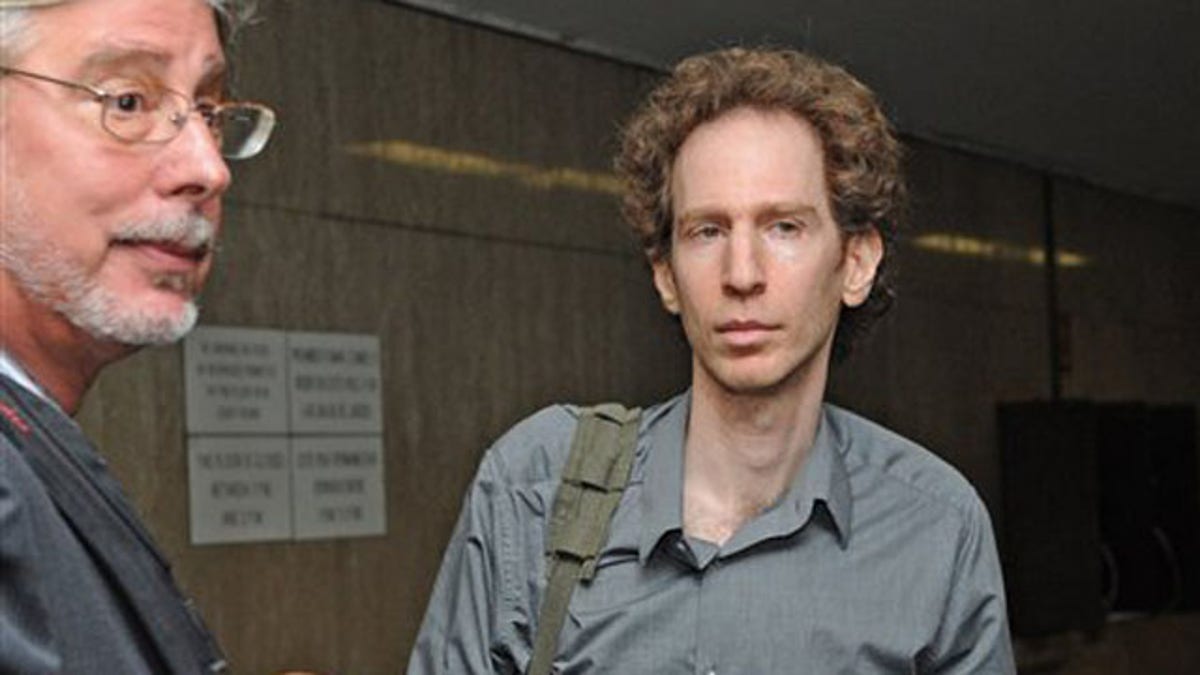
In this Sept. 27, 2010 file photo, attorney Raphael Golb, right, is seen outside the courtroom with his attorney Ron Kuby during a recess in his trial at Manhattan State Supreme court in New York. Golb, who was convicted in September of using online aliases to influence scholarly debate over the Dead Sea Scrolls, is set to be sentenced Thursday, Nov. 18 on identity theft and other charges. (AP Photo/Louis Lanzano, File) (AP)
NEW YORK – A lawyer was sentenced Thursday to six months in jail after being convicted of an ultramodern crime that was all about antiquity: using online aliases to harass people in an academic debate about the Dead Sea Scrolls.
Raphael Golb was sentenced on identity theft and other charges in a rare criminal case centered on Internet impersonation — and a very rare trial that aired a bitter scholarly debate over which ancient Jews created the scrolls.
Prosecutors said Golb crossed the line between discourse and crime by using fake e-mail accounts and writing blog posts under assumed names to discredit detractors of his father, a scholar. Golb said the writings amounted to pointed parody and academic whistle-blowing that he felt were protected by free-speech rights.
"I'm sorry for all the wounding of feelings that my e-mail antics have caused," he told a court Thursday. "Before this case, I did not know that satirical hoaxes of the sort were treated as crimes in the United States of America."
But state Supreme Court Justice Carol Berkman said his conviction was about actions, not ideas.
"It's not his words, but his conduct," she said before sentencing him. "It is still a crime to imitate people in the manner that (Golb) did. ... The victims felt invaded and hurt by this."
The gaunt, 50-year-old Golb was led away in handcuffs after court, but hours later a judge granted him $25,000 bail while he appeals his conviction.
Golb's September trial often felt like a lecture series, touching on topics ranging from Judaic studies to Enlightenment philosophy.
Found in caves in Israel beginning in the 1940s, the scrolls contain the earliest known versions of portions of the Hebrew Bible. They have provided important insight into the history of Judaism and the beginnings of Christianity.
Some scholars, including New York University Judaic studies chairman Lawrence Schiffman, say the texts were assembled by a sect known as the Essenes. Others — including Norman Golb, a University of Chicago historian and Golb's father — believe the writings were the work of a range of Jewish groups and communities.
Schiffman went to authorities after some of his students and colleagues received e-mails from an address that used his name. The e-mails appeared to have him admitting that he plagiarized Norman Golb's work and asking the recipients to keep quiet about it. Schiffman denies copying the historian's work.
Raphael Golb, a literature scholar and real estate lawyer with a Harvard Ph.D. and an NYU law degree, acknowledged during his trial that he wrote the messages. But he said he never intended for anyone to believe Schiffman actually sent them and portrayed them as "satire, irony, parody."
Manhattan assistant district attorney John Bandler said Thursday that Golb's activities weren't commentary, but "thousands of hours of malicious harassment and impersonation." He also opened up e-mail accounts in the names of other scrolls scholars besides Schiffman.
"According to him, his free-speech rights allow him to harass and impersonate others. The jury found otherwise," Bandler said.
Golb has been disbarred because of his conviction, his lawyers said. His sentence also calls for five years' probation — during which he can't engage in online discussions about the scrolls under any name but his own or "anonymous."
"The court and the district attorney's office have made the Internet safe for elite scholars to avoid being criticized," said one of his attorneys, Ron Kuby.
Internet impersonation claims have generated a number of lawsuits, but prosecutions are unusual unless phony identities are used to steal money, experts say.
In one notable case, Missouri mother Lori Drew was accused of helping her daughter and a friend pose as a teen boy on MySpace to send hurtful messages to a 13-year-old neighbor girl. The girl committed suicide.
A federal jury in California, where MySpace has its servers, convicted Drew of misdemeanor counts of accessing computers without authorization. A judge overturned the verdict and acquitted her.

